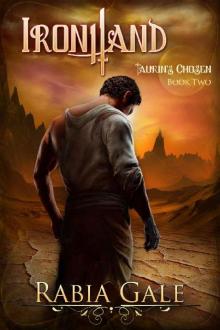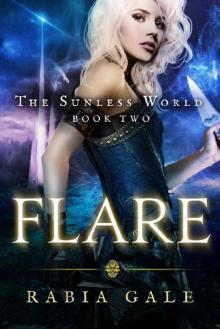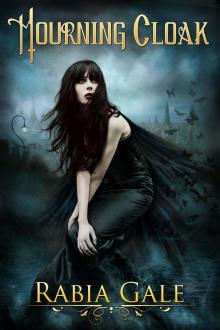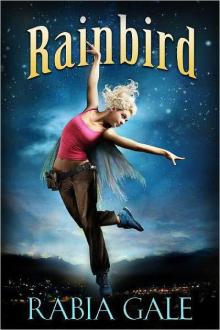- Home
- Rabia Gale
Mourning Cloak Page 2
Mourning Cloak Read online
Page 2
The sword! Not enough space, too cluttered to use it, and—what if she really is Sera? I whip out my knife, peer over the table.
She’s perched on the wall, sideways. She moves as if she were a dancer, light, walking among eggshells, unheeding of gravity. One of her wings is askew, the silk-and-ivory structure of bone and skin not yet healed. Her head turns, slow and alien. Light multiplies in the crystalline structure of her eyes.
Then she leaps—not for me, but for the door. She half-dissolves into it, half-disintegrates it. It crackles and splinters.
“No!” I disentangle myself from furniture, dash to the doorway. I smash my foot through the remnants of the door. “Come back! Are you Sera? How do you know me?”
She’s already gone, past my powdered lines that mean nothing now that I invited her in. She sinks into the wall. I grab a handful of wing and twist. She jerks, turns liquid, slides from my grasp.
I run for the door. The handle is warm, my palms sweaty and my hands trembling. It takes me too much time to wrestle the door open. I kick aside the trash can in my haste and sprint into the alley.
She’s gone. The banish light is low and an eerie man raises a lament in the distance. I lean against the brick wall, breathing hard. Heat and cold sweep over my body, as if ice water and liquid fire alternate through my veins.
No one would be out in this. The deep night is ruled by other creatures, creatures worse than mourning cloaks.
But I’m not anyone. I’m Kato the Idiot, Kato swayed by a name and a handful of words, Kato longing for things he has no right having. I reach behind the door for my coat, lock it behind me, hitch the sword belt, and set off into Highwind. To find that mourning cloak.
The square in front of my shop is empty. Across the way, a thick chain is strung through the handles of the rhyme house’s doors; a large padlock keeps it in place. A soft violet glow illuminates the display window of the button shop next door, turning the colorful assortment of coin-sized discs into shades of midnight and moonlight. The glow boards that advertize sales and performances, book buttons and group poetry during the waking hours are squat, rectangular, and dead-eyed.
A chill wind lifts long strings of bells in front of Madam Lorianne’s Ribbonery—the sound shivers through the air.
Thin trolley tracks thread across the paved brick. The flow lights are turned off, but banish lights glower all the way down to the safe road, creating a ribbon of white light for those brave enough—or stupid enough—to venture into the night. The flames-that-are-not-flames ripple as I walk past. My shoes crunch on crushed shells and salt crystals, and I thrust my hands deep into my pockets.
The safe road is glassy black, reflecting the lights as if it were made of water. It curves and winds from one side of Highwind to the other, gleaming wetly, like the back of a sea serpent. It is smooth under my feet, and warded against cobble crunchers, though this is not a night for the children of the earth.
The wind gusts in, wild and electric, from the five mountain lakes that surround the city. Tall peaks shred the clouds around them; the tattered remains scud across the sky. No, this is a night for the creatures of air and fire, for flashes and eerie men and wind swifts.
A night for mourning cloaks to kill—and be killed.
In her current state, she is prey for wind swifts and flashes.
I pull up my collar, hunch my shoulders. Where does a mourning cloak hide in the daytime? Does she fold herself small and slide into a crack? Does she hang from a wind-twisted tree in the stunted forests above the city? Does she turn into a snowflake or a trickle of water or a puff of air?
Where would a mourning cloak who thought she was an eilendi go?
And then I know.
Snowflakes drift down, shimmering in the banish lights. They melt on the safe road and on my heated skin. In a distant way, I know that I am tired and my limbs weary, but purpose swells within me, untangling the knots of doubt and fear within.
The mourning cloak might be Sera. Or she may know what had become of my wife, might be the one who’d feasted on Sera’s essence that night.
Either way, I am going to find out.
I stride off the safe road, away from the banish lights, on to pavement freshly powdered with snow. Inviting the mourning cloak to find me.
It’s not true what the Taurin-worshippers say. Revenge is satisfying. Oh, so satisfying.
I am not holding the sword, but its bloodlust stirs in my mind, swells in my body. It nuzzles me like a cat.
Once again, we are in accord.
Highwind honors no gods, recognizes no priests, gives credence to no religion but that of pleasure and progress. No peak-roofed Mistrian temples, nor spiral arrangement of conical Ton Li huts, nor any of the affectations of a hundred different faiths break the architecture of business and pleasure. Yet it is the nature of man to worship, and to congregate in worship, and it is to the only ataura—Taurin’s House—in the city that I bend my footsteps.
The spark fairies find me first. They whine around my ears, press against my lips, buzz near my nose, seeking out any orifice, any cut, any opening. Spark fairies feed from the inside. I swat several into stinging blue smears against my skin, then pull out a heat-stick from my pocket. I crack the inner glass tube. The stick warms as the chemicals inside mix. Spark fairies aren’t very smart either; once they are all focused on the heat-stick, I leave it—and them—on a hitching post.
Overhead, the wind swifts call out their piercing hunting cries above the soundless fall of snow. They are curls of darkness, all curves and movement, to my sight. I duck my head, lest the paler skin of my face stand out against my dark clothing and attract their attention. I can deal with the spark fairies and the flashes. Not wind swifts and—
The hair rising along my arms warns me, but not in enough time to avoid the attack completely. The mourning cloak flows out of the pavement, lunges at me.
Not again! I jump back, and her claws rake my abdomen, slicing through fabric and scratching a sting across my skin. Shocked into alertness, I feel everything—wetness on my lashes and cheeks, the squeak of my boots scuffing through new-fallen snow, the chill dead air surrounding the cloak.
I grab my sword. It whispers out of its sheath, a gleaming line that meets her next slash with a block. The shock reverberates through my bones, but the cloak is already flowing away, moving like a dancer in three dimensions, gliding into the air, misting through the pavement. The sword hums to me and years of practice and technique from its former masters flow into my limbs. Even so, all I can do is block, block…and block again.
I grit my teeth, move to the middle of the street, where no mourning cloak can emerge from the wall at my back, or fall upon me from a flow light.
She can’t materialize inside my body, can she? Hook her claws into my gut from the inside, twist my entrails? No, that is just my panic, rising like a tide, cold and dark, threatening to drown me. I stab wildly at her wing-cloak, but it ripples around my blade. I draw back and the hole closes up as if had never been.
This is not my mourning cloak, this one with her whole wings. If my sword can’t tear those wings, what tattered the ones of the mourning cloak I’d found?
The cloak darts in again, and I find that I don’t want to know, after all. She is weakening me, content to use her speed and dexterity to inflict a dozen small wounds, penning me in a small, tight square. She has all night, after all.
The sleeves of my coat are shredded, small cuts cris-cross my skin. My breath rasps in my lungs, grates against my ears. My bones are weighted, my muscles burn, my blood turns thick and heavy, but suddenly, somehow I can move faster. My vision, blurry with sweat, swims, then sharpens.
And then suddenly I know what’s been swelling in my body, ever since the cloak stabbed me in my house.
The transformation.
I stagger at both the jolt of the realization and the changes in my own body.
Why now? Why after these three years? Dark things creep under my skin and I n
o longer have the discipline to stop them. Cold seeps into my bones and joints, my skin hardens. My labored breathing is replaced by the pneumatic hiss of more efficient mechanisms.
The mourning cloak strikes and her claws screech against metal scales. I stand immobile as my body armors itself.
No! Never this. Not again.
I fling the sword away—or try to—but the hilt is fused to my hand. The blade is now truly an extension of my arm.
Swarms of tiny spiders scuttle under my skin, pin-prick along my nerves. They change me, despite my will. My heart thumps, not fast but steady. My guts roil and pulse as they are pulled apart, pushed aside, making way for a pulsing ball of heat in my core.
Every transformation costs me years of my life, but all I can think of is the pain of melting and reshaped bone, of half-metal, half-tissue muscle, of the corrosive fluid coursing through my fragile veins.
Freeze travels up to my brain, touches my synapses, turns them into wires. Numbers reel in front of my eyes, faster than I can count:
2, 4, 8, 16, 32, 64, 128, 256, 512…32768, 65536, 131072, 262144…1267650600228229401496703205376
And again:
3, 9, 27…
A flicker of motion in my enhanced sensors. A beautiful system of energy, a hurricane of ever-moving particles, and a second mourning cloak swims up to the first.
Two of them. The transformation will never stop now.
Then the new mourning cloak turns on the first and rips into her.
My mourning cloak. Come to save me.
Wings billow. The two of them are interrupted streams of color, bleeding energy into the air. The spiders are distracted as the mourning cloaks battle, two galaxies spinning and colliding, hemorrhaging particles like stars.
No longer in immediate danger, I force my body to relaxation. The exercises come back to me after all, and as the rush of panic subsides, so do the spiders’ depredations. I seize control of them—they are sluggish now that I’m not being attacked—and push them back to where they belong, into those dark spaces in my body where I thought I had locked them forever.
Before the cloak who fights for me brought them back out again when she pricked me.
Bitter, black anger rises again and I think of Sera, of her laughing eyes and smooth skin, of how she could be returned to me again, and the transformation ebbs. My skin turns flexible and warm, my lungs take over breathing, the fire in my belly dies, and the numbers fall and puddle in my head.
…601, 607, 613…six hundred…
I stand there, trying not to clench at the thought of the pain I know is coming. My mourning cloak takes another savage tear out of her opponent’s energy, and I see now how they are different from other people, other beings. Other living things are a steady pattern of points in my mech-sight, each point flickering but fixed, like stars in a constellation. The cloaks—are not. Their points move, vanishing and reappearing in a different place.
Is this why they can walk through walls and sink into rock? My vision loses focus, loses color, becomes once again the ordinary night-vision of a normal, slightly far-sighted man.
Every joint and ligament, tendon and muscle, bone and vein and nerve, screams its anger at the abuse it has endured. I bite my lip and feel blood.
High-pitched screams, almost beyond my hearing, stab at me as the cloaks fight. Then one of them—I can’t see who—throws herself on to her sister and the two disappear into pavement, leaving me alone.
For an instant, I stand paralyzed, sword arm limp against my side, point grazing the ground. Then, Run! Before they get back!
I stumble forward two steps, and a pool of concrete shimmers and softens right in front of me. A mourning cloak staggers out of it, like a swimmer dragging herself out of water. Crumbs of cement cling to her tattered wings, and as she reaches the lip of the pavement, she falls to her knees, her ankles still sunken into the ground. Her hand falls limp next to my foot.
I look down at the dark head and wonder again, Are you Sera?
Who else would fight for me?
Flashes of light brighten the sky behind the roofline. Electric movement roils among the low clouds. The air thickens with static and tension.
Wind swifts! I grab the cloak by her shoulders, try to pull her out of the pavement. Her feet are stuck fast. Her head lolls.
“Hey, you!” I shake her, gently at first, because her shoulders feel so thin and delicate under my hands, then harder. What do I call this mourning cloak who thinks herself human? Eilendi? And give in to her delusion? I can’t call her Sera, can’t see Sera in her features. “Hey, you. Flutter. Get yourself out of the road.”
She opens her eyes, slowly. The insectile facets gleam, then soften. White creeps across the edges. “Kato Vorsok.”
“In the flesh. Come on, the wind swifts are coming.” I glance up at the sky sparking with agitated swifts, the buildings around us, the swift rods glittering with gold foil, reflectors, and cheap shiny trinkets.
It’s not a good idea to be around when a wind swift spends itself upon a rod.
The cloak bobs her head. The pavement drips off her feet, then hardens into frozen wavelets and hairline cracks around her. A jagged green flash cracks the sky open.
“Hurry.” I grab her hand and pull her up. Together, we break into a stumbling run. Swift light throws our shadows, sharp-edged and narrow, ahead of us as it swoops down. I fumble in my pocket, find a reflector, and fling it over my shoulder.
Just in case the swift makes a last-minute course correction.
We hit wall, just as the swift impales itself upon a rod. Flutter’s shoulders crush against mine. I push her face into stone and fling my other arm over my eyes. The air crackles, grows hot. Whips of electricity arc through it and lash against my skin. My spiders pounce, reroute that sizzling energy back out, to the wall, the ground.
Flutter goes rigid beside me, her breath caught in the middle of a gasp.
Nine hells!
Cloaks are not immune to swift shock, obviously. Flutter jerks. Spasms ripple through her cloak. Sigils—almost-familiar—glow blue and white within its folds as she arches her back, head thrown back, rising on her toes.
I smack her sharply across the face. My hand burns where it makes contact with her skin. Tingles run down my nerves.
She draws in a great shuddering breath. Lets it out again. Inhales. Exhales. Now her breath is light and shallow, coming in gasps. Her muscles jump, she fades, grows solid again. The frayed edges of her cloak dissolve. A singed smell comes off her body, that fusion of skin and membrane and cloth.
“Taurin’s veil!” I bite out. “You can’t disappear, Flutter!” You haven’t led me to Sera yet!
There’s only one place I can think of to go for help. For Sera, I will go even there. I would even go back to the broken plain and hammer on the bronze gates of Tau Marai for Sera. Losing her has taught me that much, at least.
I swing the cloak back up in my arms, ignoring the way she mists against me. She has trouble controlling her form. If she slips inside my skin—shudder at the thought—would the spiders repulse her? “If you really are eilendi, Flutter,” I tell her, “you’ll like this place I’m taking you to.” As she fades in and out, I add, “Maybe not.”
Taurin-worshippers do not like foreigners, or those of their own kind who deviate from their notions of acceptable. I had found that out in my last days as Taurin’s Champion and the bitter-ash years since.
The rest of Highwind may ward itself with chimes and charms, build magic into the bones of its buildings, and run wires in the walls, but not so with the ataura. A plain square white-washed building, it is remarkable for only one thing—it has no protections against the deep creatures. Night after night, the few itauri in Highwind gather there to chant the Invocations and dance the Rakayas, with only their vigilance and their uncertain prayer-magic to keep the cloaks and eerie men away.
It is, to them, a test of faith.
One of these days, a swift-strike will obliterate t
he ataura. But then, I’d been predicting that for three years and it hasn’t happened yet.
Itauri keep to themselves, but they won’t refuse me. Even when I kick the thick wooden door repeatedly, even when Toro opens the door and recognizes me. I shoulder my way in, to save myself from his questions or—worse—his blessing. Flutter’s wings sweep the stone steps down into the circular room. Dark-eyed faces look up at me, pooled, deep, secretive. The faces of my people, who I no longer understand. I swallow a growl of frustration as I take in the room, devoid of the technological comforts that Highwinders take for granted. The cook fires, the lanterns, the small children, the circle of eilendi, novices all, intent upon their worship magic. My people, still stuck in the past, still putting themselves and their children in unnecessary danger.
No, it’s me. I have changed. I left, not them.
I put the mourning cloak down on an empty pallet, more roughly that I intended to. My hands come away sap-sticky with her blood and blackish-red from the pigmentation in her wings, seeping at their torn edges. She lies tumbled where I left her, eyes closed, chest barely moving.
The itauri lean closer to look, suck in an involuntary breath. I swear there’s a vacuum in the room.
I point at Flutter, but look at Toro. At his gentle, fine-featured face that I can no longer read. When did that rift happen, Toro on one side, me and Sera on the other? And why in nine hells didn’t I see it before the disaster at Tau Marai? “She’s one of yours. Heal her.”
A few of the itauri make warding signs, thumb and forefinger of the left hand circled, held up to the eye, then covered with the remaining fingers.
Toro doesn’t. He kneels at Flutter’s side, takes up her delicate, elongated arm, trailing cloak, and checks her pulse. He puts his ear to her chest, peers under her eyelids, just as if she were one of his own.
He is kinder to a cloak than he was to me, one of his closest friends. The questions burn in my heart still. Why, Toro? Why didn’t you and the other eilendi stand with us before the city gates? Why did you let the Dark Masters’ creatures destroy my men?

 Ironhand (Taurin's Chosen Book 2)
Ironhand (Taurin's Chosen Book 2) Flare: The Sunless World Book Two
Flare: The Sunless World Book Two Ghostlight (The Reflected City Book 1)
Ghostlight (The Reflected City Book 1) Mourning Cloak
Mourning Cloak Rainbird
Rainbird